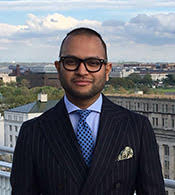Sadaf Asrar took his time to find the right master’s program for him.
After he received his undergraduate degree and got a job at Optimal Solutions group, he learned that the skills he acquired from his bachelor’s degree in economics and minor in mathematics were easily applied to the early projects he worked on at work.
 “The tools I had were transferable and I have these skills that I can use for different things, and the things I had to learn on the job was the subject matter,” Asrar said. “I may not have known the subject matter, but I could do the math.”
“The tools I had were transferable and I have these skills that I can use for different things, and the things I had to learn on the job was the subject matter,” Asrar said. “I may not have known the subject matter, but I could do the math.”
When it came to looking for the graduate program, he knew he wanted to find a program that would give him more tools to use at his job.
“When I started looking at graduate programs, I wanted a graduate program that was going to give me a robust skill set that I can use in the kind of work that I do in my job,” Asrar said.
Asrar was working full-time at job at Optimal Solutions Group LLC, a nonpartisan public policy research and software development firm that provides data-driven research and technical assistance to government agencies, corporations, NGOs, and philanthropic foundations.
The kind of work he was doing for Optimal Solutions was starting to shift and he wanted to get ahead of it.
“When the firm was founded, they were doing more traditional forms of research, either building models on existing data or doing surveys,” Asrar said. “Now we have access to data that is digitized, but often just stored somewhere and not analyzed. So, we were getting into the business of creating data systems.”
Since many of their clients were in the public policy space, Asrar began thinking about a master’s in public policy (MPP). He considered statistics programs and data science programs, but he felt that he already had those math skills.
“I started looking at hardcore statistics programs but some of them were very specific and I really wanted something more customizable,” Asrar said.
Asrar looked at many schools and programs and eventually settled on George Washington University (GW). He liked that it was in the D.C. area and that they had a highly regarded MPP program.
“The programs offered different subject matter expertise or were more focused on technical skills and I felt that their program would give me a lot of freedom to learn different things,” Asrar said. “When I went to visit, their attitude was that everything revolves around the students, and I thought that this is the school for me.”
Asrar said that when he realized he wanted to take a data science class that it was easy to get permission from his MPP advisor and the professor teaching the data science course. He enjoyed it and ended up taking six data science courses which was enough for a concentration. He went to his MPP advisor again, pitched creating his own concentration in data science and she fully supported the idea. He was the first MPP student to have a concentration in data science.
“I was surprised at how student-centric GW is,” Asrar said. “They were very much about what you want to do… ‘you tell us, and we can help you shape it for you.’”
Asrar said another thing that was helpful was that the program encouraged students to work or pursue internships. This type of culture made it easy for him to incorporate what he was learning with projects happening at his job.
“I could go to my professors and tell them I have a work project and I think this could very much benefit from what I’m learning,” Asrar said. “I’d get permission from my clients and then write my paper topic for a class on something I was doing for a client.”
Asrar had been aware of the evolving need for data systems from their clients, so after he received his MPP he brought the idea of creating a data science department to his bosses.
“I pitched them the idea, they considered it and said yes, let’s do it,” Asrar said. “They said, ‘congratulations, you are a department of one.’”
Asrar said they have begun to build up the department and he feels that the skills he learned from getting his MPP and data science concentration led to them being able to lead this department. And now with the policy background, he is also able to serve as a principal investigator for federal contracts and evaluations.
“In addition to doing the data science work, I was the principal investigator of four studies that were commissioned by the US Small Business Administration. They are all published and they’re in the public domain,” Asrar said. “I’m in the process of finishing a fifth study and I’m in the middle of a sixth study.”
Asrar credits his bosses at Optimal for creating a culture that encourages getting a master’s degree, which he says helped make it easier for him to work full-time while getting his degree.
“They have a tuition reimbursement program, and they were flexible with me leaving early on certain days so I could get to class,” Asrar said. “It is the total holistic support that I got that is very important.”
